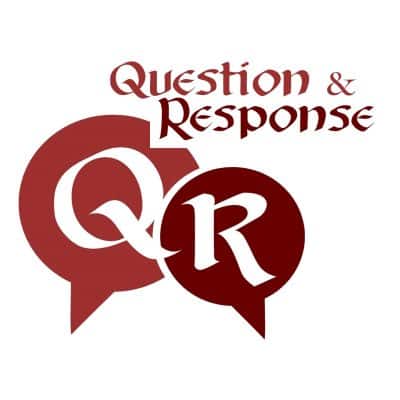Q&R with Brad Jersak – “Was the early church anti-Semitic?”
Question
Hi Brad,
I’ve run into a few guys that are saying that the Church Fathers were anti-Semitic. Consequently, they at least think the writings of the Church Fathers should be disregarded in what they had to say. There certainly was some anti-Semitism embedded in Christianity but it seems ill-advised to me to disregard the Church Father’s writings because of it.
I’d love to hear your thoughts on this topic if you can spare the time.
Response
Before I say respond to your question, let me begin by directly and without qualification denouncing anti-Semitism in all its forms, including the ancient calls to expel or exterminate Jews, the modern atrocities connected to the Holocaust and the more recent resurgence of white supremacy in North America and Europe. In case you aren’t aware, note also the undertones of anti-Jewish sentiment behind buzz words such as “New York media” or “Hollywood elite.” The far-right uses these as code for “the Jews.”
Now to your question:
The alleged anti-Semitism in both the New Testament documents reflects a few important realities of the ancient church:
The Judaoi
First, when we read about “the Jews” in the Gospels and among many of the Fathers, they are hardly ever referring pejoratively to Jews as a race or faith in general. Indeed, those who refer disparagingly to “the Jews” were themselves Jews. Rather, these authors use the word Judaoi specifically for the Judean Temple establishment and especially the Jerusalem Sanhedrin who condemned Christ to death and demanded his crucifixion. We see this narrow, negative use of the term by Jewish Christians in texts like the Gospel of John and Mileto of Sardis (in his homily, “On Pascha.” These Judaio—Judean-based religious opposition—were conspirators in what Stephen [also a Jew] called an unjust “murder” after Pilate had formally rendered the verdict, “Not guilty.”
Second, Judaio (i.e. the Sanhedrin) launched a major, bloody persecution of the Christian Jewish minority throughout the first century, particularly through the pogroms of Saul of Tarsus, who would later himself experience that same hostility. The arrests and martyrdom of Christians at the hands of the Sanhedrin’s synagogue allies caused the early Christian Jews to identify with the suffering of Christ. They see their own persecution as analogous to Christ’s crucifixion. This association enters their way of talking about their anti-Christian opponents as the opposition Judaio, reflecting also the apostles’ experience. But again, my sense is that Jewish persecution of Christians was focused specifically on Jewish Christians as they were being driven out of the synagogues. Once cast out, these Christian Jews would lose their synagogue exemption from emperor worship and became fair game for the lions … all thanks to the Judaio (which now extended beyond Judea and the Temple to their post-AD 70 synagogue opponents across the Mediterranean.
Third, while modern anti-Semitism has so often featured inexcusable “Christian” majority populations complicit in the oppression and slaughter of Jews (for being Jews), the demographics in the first century were completely reversed. Large Jewish populations lived across the Mediterranean and the Middle East, among whom were the smaller and more vulnerable Jewish Christian sect. Religious persecution is ugly regardless of who is perpetrating it, so we should never seek to silence the lament of those who endure it, or how they try to make sense of it, whether the victims are early Jewish Christians by anti-Christian Jews or non-Christian Jews by Gentile Christians thereafter. To regard their resistance to persecution as anti-Semitic is a [literally] brutal anachronism. St. Paul, for example, was a repentant persecutor, not a self-hating Jew.
The Seeds of Anti-Semitism
Fourth, the language of the Fathers mainly reflects this backstory of hostility and persecution as it extends over the following centuries. Eventually, the synagogue Jews did succeed in driving out all the Christian Jews so that Christianity became increasingly cut off from ethnic Judaism and as it spread, eventually became a majority Gentile movement. They became two distinct and hostile faiths for the most part. Judaism’s hostility to Christianity was no longer an inter-Jewish conflict and the Jewish rabbis came to adopt a generally anti-Christian stance and visa versa. The movements become altogether divorced and a general enmity set in between them. And that’s where we begin to see the real seeds of anti-Semitism where Christians began to generalize the unrighteous acts of the Judaoi with general prejudice toward ethnic Jews generally.
This is bad news for the Jews once Christianity is adopted by the Holy Roman Empire. As we get into later centuries, the power of rhetoric to incite violence against Jews (I think of Cyril of Alexandria in the 5th century) would be amplified into direct and obvious anti-Semitism (as we see much later in Martin Luther) and ultimately German Christianity’s acquiescence to and participation in Holocaust.
Beyond Anachronisms
But I would not read that escalation anachronistically, as if all the early Fathers were ant-Semitic in the modern sense. I would not negate the great revelations of theologians in that era because some of them had left the Jesus Way of love and forgiveness toward their enemies. I would not excuse any unChristlike hatred or violence towards Jews by the early church as simply being “men of their age.” Jesus Christ and the apostle Paul were men of their age and they both forbade hatred, violence and retaliation, even of their murderers. But nor would most of the great Fathers. Rather, many of them suffered torture and martyrdom with grace and have earned their right to be heard to this day.










 Plain Truth Ministries | Box 300 | Pasadena, CA 91129-0300
Plain Truth Ministries | Box 300 | Pasadena, CA 91129-0300

